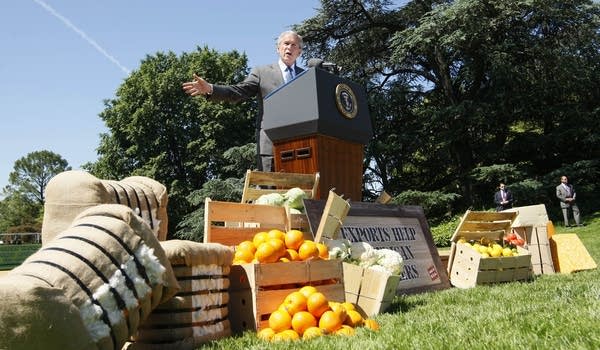Minn. delegation split on party lines over free trade agreements
Go Deeper.
Create an account or log in to save stories.
Like this?
Thanks for liking this story! We have added it to a list of your favorite stories.

When the U.S. House of Representatives votes Wednesday on free trade agreements with South Korea, Panama and Colombia, advocates of the proposals will tout their potential to create jobs.
"This is a sure-fire way to create good U.S. jobs and boost economic growth by opening new markets for U.S. goods and services," said U.S. Rep. Erik Paulsen, a Republican from Minnesota. "It's new sales; it's new customers."
Paulsen's fellow Minnesota Republicans, Reps. John Kline and Michele Bachmann, also support all three trade deals. Rep. Chip Cravaack is still studying them.
But the three bills pose a dilemma for the Democrats in Minnesota's congressional delegation. Although they want to create jobs, they're weighing the objections of unions who contend such trade deals are good for corporations but can harm U.S. workers when businesses take advantage of cheaper labor overseas.
Turn Up Your Support
MPR News helps you turn down the noise and build shared understanding. Turn up your support for this public resource and keep trusted journalism accessible to all.
IMPACT IN MINNESOTA
It's hard to quantify how states such as Minnesota will gain from trade pacts with Korea, Colombia and Panama. Katie Clark, executive director of the Minnesota Trade Office, said her staff found it difficult to determine how many jobs the deals could generate.
"They said with the data we have, it's really hard to put a definitive number to what job growth may be created," she said.
However, many parts of Minnesota's economy should benefit if Congresses passes the agreement with Korea, the largest of the three trade deals under consideration, said Clark, who recently traveled to Korea on a trade mission with Gov. Mark Dayton.
"It gives our agriculture producers immediate elimination of duties on nearly two-thirds of exports to Korea," Clark said. "For Minnesota, that's significant."
That would be good news for companies such as Hormel and General Mills.
Another business sector that could see big gains from a deal with Korea is Minnesota's medical device industry, said Tom Holmes, an economist at the University of Minnesota.
"When Medtronic or St. Jude Medical try to sell pacemakers in South Korea, it really helps if they can sell them duty free when up against competition against their European and Japanese rivals," he said.
Holmes doesn't see much harm to the state's economy from the greater competition that will come from an agreement between the United States and Korea. He said that because Minnesota does not have an auto industry or make touch-screen telephones, the state does not produce many goods that compete directly with the Korean products.
But while the state's agribusiness and medical device firms may benefit, labor unions say that overall, Minnesota workers will suffer because cheaper imports will crowd out American firms and encourage companies to move production to lower-cost locations overseas.
Rick Ryan, assistant directing business representative for the International Association of Machinists in Minnesota, points to the North American Free Trade Agreement with Canada and Mexico in the 1990s.
"These free trade agreements seem to really be good for multinational corporations, but they don't really seem to do much for workers, particularly skilled workers," Ryan said.
Jessica Letween, director of the Minnesota Fair Trade Coalition, cites a federal study that concludes sectors that employ nearly 60,000 Minnesota workers could see job losses under the Korea free trade agreement.
"It's mostly in manufacturing sectors that quite often are good paying family-sustaining jobs, so that's a concern for us," Letween said.
TOUGH CALL FOR MINNESOTA DEMS
The union opposition has made this a tough vote for Democrats in Minnesota's Congressional delegation.
Both U.S. Rep. Keith Ellison and Rep. Betty McCollum are likely to vote no on all three bills.
Rep. Tim Walz supports the Korean agreement but not the deals with Panama or Colombia, in part because of Colombia's poor record of protecting labor organizers, he said.
Minnesota's two Democratic senators say they also oppose the Colombia deal.
Sen. Amy Klobuchar said she likely will vote for the trade agreements with South Korea and Panama while Sen. Al Franken said he's still studying them.
If Congress approves all three trade deals, supporters say 250,000 jobs will be created.
But with more than 14 million Americans unemployed, the agreements will make only a very modest contribution to solving the nation's unemployment crisis.




